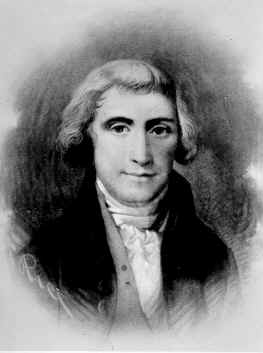James O'Hara (quartermaster) facts for kids
James O'Hara (born around 1752, died 1819) was an important American military officer and a successful businessman. He was a leader in developing industries in Pittsburgh, Pennsylvania, United States.
Quick facts for kids
James O'Hara
|
|
|---|---|
 |
|
| Born | 1752 somewhere in County Mayo, Ireland |
| Died | December 21, 1819 Pittsburgh, PA |
| Allegiance | United Kingdom US Army |
| British Army Continental Army |
|
| Rank | Quartermaster General |
| Unit | Coldstream Guards 3rd Virginia Regiment |
| Battles/wars | American Revolutionary War |
Contents
Early Life and Business Skills
James O'Hara was born in County Mayo, Ireland. His father was Major John O'Hara. In 1765, James went to a special school in Paris, France.
He later joined the Coldstream Guards, a famous regiment in the British Army, in 1770. But he soon left to learn about business. He worked as a clerk in a shipping office in Liverpool, England. His big dream was to move to America and find new business chances.
Moving to America
O'Hara arrived in Philadelphia, Pennsylvania in 1772. By 1773, he had settled in Pittsburgh. This was a frontier area at the time. He worked for traders and learned how to do business with Native Americans. He spent two years learning about the customs of Western Pennsylvania and Virginia.
In 1774, he became a government agent for the Native Americans. He also started buying large areas of land. His ability to speak French and learn Native American languages helped him a lot.
Military Service in the U.S.
When the American Revolutionary War began, James O'Hara joined the army. He became a captain in the 3rd Virginia Regiment. He served at important places like Fort Pitt and Fort Kanawha.
Later, he worked in army hospitals. From 1781 to 1783, he was an assistant to General Nathanael Greene. On April 19, 1792, U.S. President George Washington chose him for a very important job. O'Hara became the sixth Quartermaster General of the U.S. Army. This meant he was in charge of supplying the army. He held this role until 1796.
People often called him "Colonel" O'Hara. This was because his job gave him the same pay and benefits as a lieutenant colonel. He always signed his letters as "James O'Hara, Q.M.G." (Quartermaster General).
Building a Business Empire
In 1783, James O'Hara met and married Mary Carson in Philadelphia. They had six children together. In 1784, they moved back to Pittsburgh. There, he opened a general store called O'Hara & Company.
For the next ten years, he worked as a government contractor. He supplied food and other items to Generals Josiah Harmar and Arthur St. Clair during the Indian wars.
Pittsburgh's Industrial Leader
By the 1790s, O'Hara was a very important businessman in Pittsburgh. He started the Pittsburgh Glassworks in 1795. This was a big step for industry in the area.
He also started a salt business and a sawmill. With his partner John Reed, he opened the Pittsburgh Point Brewery. He invested money in building ships and in an ironworks. He even became the president of the Bank of Pennsylvania. All this time, he kept buying and selling land in Pittsburgh and Allegheny County.
Public Service and Legacy
James O'Hara was part of the Federalist Party. He only tried for a political job once. In 1802, he ran for U.S. Congress but did not win. However, in 1803, he became Pittsburgh's chief burgess. Today, this job is known as mayor.
James O'Hara passed away at his home in Pittsburgh on December 21, 1819.
Remembering James O'Hara
James O'Hara is remembered in many ways. Streets in Pittsburgh are named after him. There is also a suburb called O'Hara Township, Pennsylvania. A ship used in World War II, the USS James O'Hara (APA-90), was named in his honor.
In 1963, a writer named Agnes Sligh Turnbull wrote a book about his life. It was called The King's Orchard.
O'Hara is also the grandfather of Mary Schenley. Mary later gave much of her grandfather's land to the growing city of Pittsburgh. This land became famous places like Schenley Park, Schenley Plaza, and the Schenley Farms neighborhood. His old home, the Neill Log House, is still preserved in Schenley Park as a historic building.

